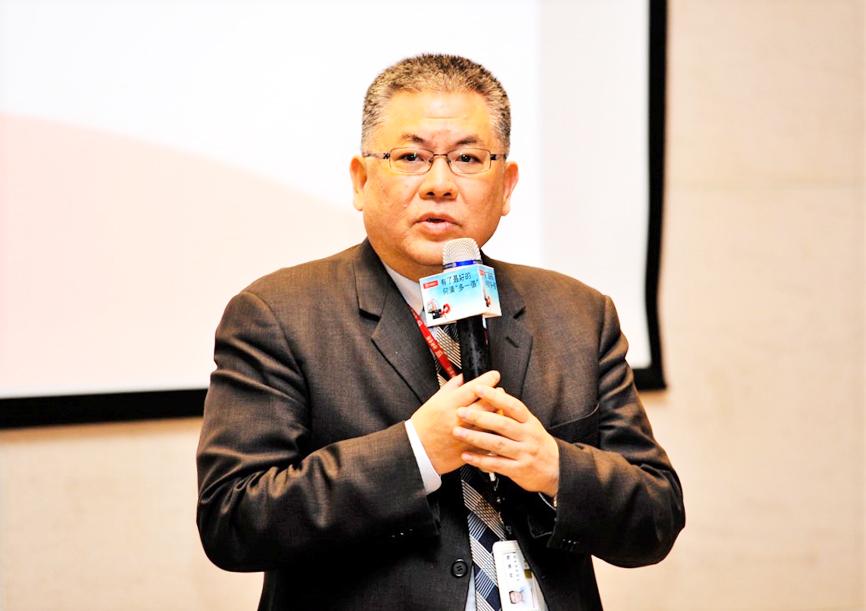Taishin Financial Holding Co (台新金控) will continue boosting its online banking service Richart to protect its lead as three Web-only banks gear up for their launch before the end of the year, the company told an investors’ conference in Taipei yesterday.
“We currently have a total of 2.25 million digital savings accounts, which suggests a market share of more than 40 percent. With our award-winning Richart service, we are confident about maintaining our advantage,” said Oliver Shang (尚瑞強), president of Taishin International Bank (台新銀行), the banking arm of Taishin Financial.
The bank in August launched a financial ecosystem, dubbed Richart Life, in cooperation with more than 20 partners in various industries such as wholesale, retail, department stores, tourism, air travel, food and dining, telecoms, e-commerce and food delivery, Shang said.

Photo: Kelson Wang, Taipei Times
As the bank offers reward points for consumers who use the services in the shared marketplace, more than 1 million users have signed up as members over the past three months, he said.
“We will continue expanding our ecosystem, providing more rewards for our users and enabling them to conveniently shop with our payment tools,” Shang said.
Taishin Bank reported a net profit of NT$3.53 billion (US$122.44 million) for last quarter, down 2 percent from a quarter earlier.
Net interest margin slid from 1.22 percent to 1.13 percent at the end of September, it said.
However, profit grew 20 percent from a year earlier, as net fee income generated from its credit card operations gained 9.5 percent annually to NT$309 million and those from the corporate loans increased 31 percent to NT$399 million, company data showed.
Corporate loans rose 7.2 percent annually to NT$551 billion last quarter, with a focus on small and medium-sized manufacturing enterprises, while mortgage loans grew 13 percent to NT$315 billion, data showed.
By comparison, net fee income from its wealth management operations was flat, while consumer loans dropped 8.6 percent annually, the data showed.
Overall, the bank reported an annual drop of 2 percent in net profit for the first nine months to NT$9.8 billion, as it had not fully recovered from a plunge in investment gains in the first quarter.
Cushioned by the rising profit of Taishin Securities Co (台新證券), Taishin Financial’s net profit for the first three quarters slid 1 percent to NT$11.7 billion.

To many, Tatu City on the outskirts of Nairobi looks like a success. The first city entirely built by a private company to be operational in east Africa, with about 25,000 people living and working there, it accounts for about two-thirds of all foreign investment in Kenya. Its low-tax status has attracted more than 100 businesses including Heineken, coffee brand Dormans, and the biggest call-center and cold-chain transport firms in the region. However, to some local politicians, Tatu City has looked more like a target for extortion. A parade of governors have demanded land worth millions of dollars in exchange

Hong Kong authorities ramped up sales of the local dollar as the greenback’s slide threatened the foreign-exchange peg. The Hong Kong Monetary Authority (HKMA) sold a record HK$60.5 billion (US$7.8 billion) of the city’s currency, according to an alert sent on its Bloomberg page yesterday in Asia, after it tested the upper end of its trading band. That added to the HK$56.1 billion of sales versus the greenback since Friday. The rapid intervention signals efforts from the city’s authorities to limit the local currency’s moves within its HK$7.75 to HK$7.85 per US dollar trading band. Heavy sales of the local dollar by

Taiwan Semiconductor Manufacturing Co’s (TSMC, 台積電) revenue jumped 48 percent last month, underscoring how electronics firms scrambled to acquire essential components before global tariffs took effect. The main chipmaker for Apple Inc and Nvidia Corp reported monthly sales of NT$349.6 billion (US$11.6 billion). That compares with the average analysts’ estimate for a 38 percent rise in second-quarter revenue. US President Donald Trump’s trade war is prompting economists to retool GDP forecasts worldwide, casting doubt over the outlook for everything from iPhone demand to computing and datacenter construction. However, TSMC — a barometer for global tech spending given its central role in the

An Indonesian animated movie is smashing regional box office records and could be set for wider success as it prepares to open beyond the Southeast Asian archipelago’s silver screens. Jumbo — a film based on the adventures of main character, Don, a large orphaned Indonesian boy facing bullying at school — last month became the highest-grossing Southeast Asian animated film, raking in more than US$8 million. Released at the end of March to coincide with the Eid holidays after the Islamic fasting month of Ramadan, the movie has hit 8 million ticket sales, the third-highest in Indonesian cinema history, Film